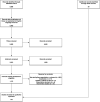Influences on cognitive outcomes in adult patients with gliomas: A systematic review
- PMID: 36033458
- PMCID: PMC9407441
- DOI: 10.3389/fonc.2022.943600
Influences on cognitive outcomes in adult patients with gliomas: A systematic review
Abstract
People with brain tumors, including those previously treated, are commonly affected by a range of neurocognitive impairments involving executive function, memory, attention, and social/emotional functioning. Several factors are postulated to underlie this relationship, but evidence relating to many of these factors is conflicting and does not fully explain the variation in cognitive outcomes seen in the literature and in clinical practice. To address this, we performed a systematic literature review to identify and describe the range of factors that can influence cognitive outcomes in adult patients with gliomas. A literature search was performed of Ovid MEDLINE, PsychINFO, and PsycTESTS from commencement until September 2021. Of 9,998 articles identified through the search strategy, and an additional 39 articles identified through other sources, 142 were included in our review. The results confirmed that multiple factors influence cognitive outcomes in patients with gliomas. The effects of tumor characteristics (including location) and treatments administered are some of the most studied variables but the evidence for these is conflicting, which may be the result of methodological and study population differences. Tumor location and laterality overall appear to influence cognitive outcomes, and detection of such an effect is contingent upon administration of appropriate cognitive tests. Surgery appears to have an overall initial deleterious effect on cognition with a recovery in most cases over several months. A large body of evidence supports the adverse effects of radiotherapy on cognition, but the role of chemotherapy is less clear. To contrast, baseline cognitive status appears to be a consistent factor that influences cognitive outcomes, with worse baseline cognition at diagnosis/pre-treatment correlated with worse long-term outcomes. Similarly, much evidence indicates that anti-epileptic drugs have a negative effect on cognition and genetics also appear to have a role. Evidence regarding the effect of age on cognitive outcomes in glioma patients is conflicting, and there is insufficient evidence for gender and fatigue. Cognitive reserve, brain reserve, socioeconomic status, and several other variables discussed in this review, and their influence on cognition and recovery, have not been well-studied in the context of gliomas and are areas for focus in future research.
Systematic review registration: https://www.crd.york.ac.uk/prospero/, identifier CRD42017072976.
Keywords: attention; brain tumor; cognitive function; executive function; glioma; memory; outcome.
Copyright © 2022 Kirkman, Hunn, Thomas and Tolmie.
Figures
Similar articles
-
Folic acid supplementation and malaria susceptibility and severity among people taking antifolate antimalarial drugs in endemic areas.Cochrane Database Syst Rev. 2022 Feb 1;2(2022):CD014217. doi: 10.1002/14651858.CD014217. Cochrane Database Syst Rev. 2022. PMID: 36321557 Free PMC article.
-
Long-term neurocognitive and other side effects of radiotherapy, with or without chemotherapy, for glioma.Cochrane Database Syst Rev. 2019 Aug 5;8(8):CD013047. doi: 10.1002/14651858.CD013047.pub2. Cochrane Database Syst Rev. 2019. PMID: 31425631 Free PMC article.
-
Screening for Cognitive Impairment in Older Adults: An Evidence Update for the U.S. Preventive Services Task Force [Internet].Rockville (MD): Agency for Healthcare Research and Quality (US); 2013 Nov. Report No.: 14-05198-EF-1. Rockville (MD): Agency for Healthcare Research and Quality (US); 2013 Nov. Report No.: 14-05198-EF-1. PMID: 24354019 Free Books & Documents. Review.
-
Behavioural modification interventions for medically unexplained symptoms in primary care: systematic reviews and economic evaluation.Health Technol Assess. 2020 Sep;24(46):1-490. doi: 10.3310/hta24460. Health Technol Assess. 2020. PMID: 32975190 Free PMC article.
-
A systematic review of cognitive interventions for adult patients with brain tumours.Cancer Med. 2023 May;12(10):11191-11210. doi: 10.1002/cam4.5760. Epub 2023 Mar 7. Cancer Med. 2023. PMID: 36880363 Free PMC article. Review.
Cited by
-
Clusters of resilience and vulnerability: executive functioning, coping and mental distress in patients with diffuse low-grade glioma.J Neurooncol. 2024 Aug;169(1):95-104. doi: 10.1007/s11060-024-04704-4. Epub 2024 Jun 19. J Neurooncol. 2024. PMID: 38896357 Free PMC article.
-
Interventions for preventing and ameliorating cognitive deficits in adults treated with cranial irradiation.Cochrane Database Syst Rev. 2022 Nov 25;11(11):CD011335. doi: 10.1002/14651858.CD011335.pub3. Cochrane Database Syst Rev. 2022. PMID: 36427235 Free PMC article. Review.
-
Perioperative Neurocognitive Function in Glioma Surgery.Curr Oncol Rep. 2024 May;26(5):466-476. doi: 10.1007/s11912-024-01522-9. Epub 2024 Apr 4. Curr Oncol Rep. 2024. PMID: 38573439 Review.
-
Response to letter regarding "Assessing the association between preoperative neurocognitive status and IDH1 mutation status in high-grade gliomas: A deeper look into potential confounding variables.".Neurooncol Pract. 2023 Aug 25;10(6):597-598. doi: 10.1093/nop/npad045. eCollection 2023 Dec. Neurooncol Pract. 2023. PMID: 38009118 Free PMC article. No abstract available.
-
Long-term follow up of patients with WHO grade 2 oligodendroglioma.J Neurooncol. 2023 Aug;164(1):65-74. doi: 10.1007/s11060-023-04368-6. Epub 2023 Aug 21. J Neurooncol. 2023. PMID: 37603235 Free PMC article.
References
-
- van Kessel E, Baumfalk AE, van Zandvoort MJE, Robe PA, Snijders TJ. Tumor-related neurocognitive dysfunction in patients with diffuse glioma: A systematic review of neurocognitive functioning prior to anti-tumor treatment. J Neurooncol (2017) 134:9–18. doi: 10.1007/s11060-017-2503-z - DOI - PMC - PubMed
Publication types
LinkOut - more resources
Full Text Sources




